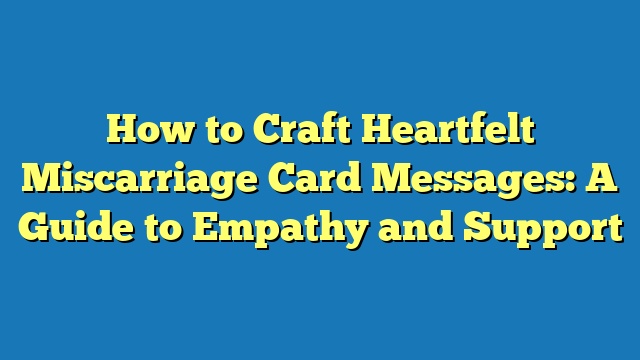A miscarriage card message is a heartfelt note sent to an individual or couple who has experienced the loss of a pregnancy. It typically expresses sympathy, support, and acknowledgment of the profound grief that comes with a miscarriage.
Offering solace and comfort during such a difficult time, miscarriage card messages play a vital role in easing the burden of loss. Throughout history, people have sought ways to express their condolences, and miscarriage card messages have emerged as a meaningful form of support.
This article delves into the significance of miscarriage card messages, highlighting their therapeutic benefits and exploring the evolution of their use over time. We will also provide practical advice on crafting heartfelt messages that convey compassion and understanding.
Miscarriage Card Message
Miscarriage card messages are essential in providing support and expressing condolences during a difficult time. They serve various purposes, encompassing empathy, acknowledgment, and offering comfort.
- Sympathetic: Expressing understanding and compassion for the loss.
- Supportive: Offering words of encouragement and support during the grieving process.
- Acknowledging: Recognizing the reality and significance of the loss.
- Hopeful: Providing words of hope and encouragement for the future.
- Respectful: Honoring the individual’s privacy and grief.
- Personal: Tailoring the message to the specific recipient and their circumstances.
- Timely: Sending the message promptly to show immediate support.
- Appropriate: Using language that is sensitive and appropriate for the situation.
These aspects are crucial for crafting meaningful miscarriage card messages that resonate with the recipient. They provide a framework for expressing empathy, support, and understanding, ultimately helping individuals navigate the challenging journey of grief and loss.
Sympathetic
Sympathetic miscarriage card messages play a crucial role in conveying understanding and compassion for the loss experienced by the recipient. They serve as a powerful tool in acknowledging the pain and grief associated with miscarriage. When crafting a sympathetic message, it is essential to use empathetic language that demonstrates a deep understanding of the emotions the recipient may be going through.
Real-life examples of sympathetic miscarriage card messages include:
“I am so sorry for the loss of your little one. I can’t imagine what you must be going through right now.””My heart breaks for you and your family. Please know that I am here for you if you need anything.””I am deeply saddened by the news of your miscarriage. I want you to know that I am thinking of you during this difficult time.”
Sympathetic miscarriage card messages provide emotional support and validation to the recipient. They help individuals feel understood and supported during a time when they may feel isolated and alone. By expressing compassion and understanding, miscarriage card messages play a vital role in the healing process, allowing individuals to process their grief and begin to move forward.
Supportive
Supportive miscarriage card messages play a vital role in providing encouragement and support to individuals who have experienced a miscarriage. They offer a glimmer of hope and strength during a time of immense grief and loss.
-
Emphasizing Resilience
Supportive messages can remind the recipient of their inner strength and resilience. By acknowledging their ability to overcome challenges, they can foster a sense of hope and empowerment.
-
Sharing Personal Experiences
If appropriate, sharing personal experiences of overcoming loss can provide comfort and solidarity. It demonstrates that healing is possible and that they are not alone in their journey.
-
Offering Practical Assistance
Practical support, such as offering to run errands, cook meals, or provide childcare, can alleviate some of the burdens associated with grief.
-
Encouraging Professional Help
If needed, supportive messages can gently encourage the recipient to seek professional help. Therapy or counseling can provide a safe space to process their emotions and develop coping mechanisms.
By incorporating these supportive elements into miscarriage card messages, individuals can offer meaningful comfort and encouragement to those who are grieving. These messages serve as a beacon of hope, reminding recipients that they are not alone and that healing is possible.
Acknowledging
Acknowledging the reality and significance of the loss is a crucial aspect of miscarriage card messages. It involves recognizing the profound grief and emotional turmoil that accompanies miscarriage.
-
Validation of Emotions
Acknowledgment validates the recipient’s emotions and experiences. It lets them know that their feelings of sadness, anger, and loss are normal and understandable.
-
Honoring the Memory
Acknowledgment honors the memory of the lost child. It recognizes the significance of their existence, even if it was brief.
-
Breaking the Silence
Acknowledgment breaks the silence and stigma surrounding miscarriage. It opens up a dialogue about pregnancy loss and allows people to talk about their experiences.
-
Facilitating Healing
Acknowledgment is a necessary step in the healing process. It allows individuals to begin to process their grief and move towards recovery.
By acknowledging the reality and significance of the loss, miscarriage card messages provide comfort and support to grieving individuals. They validate their emotions, honor the memory of their child, break the silence surrounding miscarriage, and facilitate the healing process.
Hopeful
In the context of miscarriage card messages, providing words of hope and encouragement for the future plays a vital role in supporting grieving individuals. It acknowledges the immense loss and pain they are experiencing while offering a glimmer of hope and resilience.
Hopeful messages can remind recipients that healing is possible and that they can find joy and meaning in life again. They can also encourage individuals to focus on the positive aspects of their lives and to seek support from loved ones and professionals during this challenging time.
Real-life examples of hopeful miscarriage card messages include:
“Although your heart is heavy now, know that time can heal the pain. There will be brighter days ahead.””Remember the love and support that surrounds you. You are not alone in this journey.””While your little one may not be here physically, their memory will live on in your heart forever.”
The practical significance of understanding the importance of hopeful messages in miscarriage card messages lies in its ability to provide comfort and encouragement to grieving individuals. By offering words of hope and resilience, these messages can help recipients cope with their loss and begin to envision a future filled with hope and possibility.
Respectful
In the realm of miscarriage card messages, respecting the individual’s privacy and grief is of paramount importance. It involves recognizing the highly sensitive and personal nature of miscarriage and approaching it with utmost care and empathy.
-
Sensitivity to Timing
Respectful messages acknowledge that the timing of the message can be crucial. Sending the message too soon may overwhelm the recipient, while delaying it excessively might diminish its impact. It’s essential to allow the individual ample space to process their emotions before reaching out.
-
Privacy and Confidentiality
Maintaining privacy is vital. Avoid sharing the recipient’s personal information or details of their miscarriage with others. Respect their need for privacy and confidentiality during this vulnerable time.
-
Empathetic Language
Using empathetic and compassionate language is essential. Instead of using generic or dismissive phrases, tailor your message to the specific needs and experiences of the recipient. Show that you understand their pain and are there to support them.
-
Avoid Clichs
Clichs and platitudes can come across as insincere or dismissive. Instead, opt for genuine and heartfelt words that convey your understanding and support. Personal anecdotes or shared experiences can be particularly meaningful.
Respecting the individual’s privacy and grief in miscarriage card messages is not merely a matter of etiquette but a fundamental acknowledgment of the profound loss and emotional turmoil they are experiencing. By approaching this task with sensitivity, empathy, and respect, we can provide genuine comfort and support during a time of great need.
Personal
In the context of miscarriage card messages, personalization is paramount. It involves tailoring the message to the specific recipient and their unique circumstances, ensuring that it resonates deeply and provides genuine comfort and support.
-
Relationship to the Recipient
Consider your relationship to the recipient. Are you a close friend, family member, colleague, or acquaintance? Understanding your connection will guide the tone and content of your message.
-
Recipient’s Personality and Preferences
Think about the recipient’s personality, values, and preferences. Are they private or open about their emotions? Do they prefer direct or indirect language? Customizing your message to their style will make it more meaningful.
-
Specific Details of the Loss
If appropriate, acknowledge specific details of the loss, such as the gestational age or the recipient’s hopes and dreams for the pregnancy. This shows that you are aware of their unique experience and that you care about the details.
-
Cultural and Religious Considerations
Be mindful of any cultural or religious beliefs and practices that may influence the recipient’s grieving process. Respect their traditions and incorporate relevant symbols or language into your message.
By personalizing miscarriage card messages, you demonstrate that you have taken the time to understand and connect with the recipient. This level of care and attention can make a significant difference in providing comfort and support during a difficult time.
Timely
In the context of miscarriage card messages, sending the message promptly is crucial for conveying immediate support and empathy. It demonstrates that the sender cares about the recipient’s well-being and is there for them during this difficult time.
-
Expressing Care and Concern
A timely message shows the recipient that their loss is acknowledged and that their grief is understood. It conveys a sense of care and concern, letting them know that they are not alone.
-
Offering Emotional Support
By reaching out promptly, the sender can provide emotional support when the recipient may feel most vulnerable. This support can help them cope with the initial shock and begin to process their emotions.
-
Facilitating Communication
A timely message opens the door for further communication. It shows the recipient that the sender is available to listen, offer support, or simply provide a space to express their feelings.
-
Honoring the Memory
Sending a message promptly can be a way to honor the memory of the lost child. It shows the recipient that their child’s life was valued and that their loss is being acknowledged.
Overall, sending a miscarriage card message promptly is an important aspect of providing support and comfort to grieving individuals. It not only conveys immediate care and concern but also facilitates emotional support, open communication, and honors the memory of the lost child.
Appropriate
Appropriate language in miscarriage card messages is paramount to convey empathy, respect, and support. It involves understanding the emotional turmoil that the recipient is experiencing and using words that are sensitive and comforting.
-
Emphasize support:
Focus on offering support and understanding rather than dismissive or minimizing language. Avoid clichs or platitudes that may come across as insincere.
-
Avoid judgment:
Refrain from making judgments or offering unsolicited advice. Instead, let the recipient know that you are there to listen and support them.
-
Respect privacy:
Be mindful of the recipient’s privacy and avoid sharing their personal information or details of their miscarriage with others.
-
Consider cultural and religious beliefs:
Respect the recipient’s cultural and religious beliefs, which may influence their grieving process and the language they find comforting.
By adhering to these guidelines, miscarriage card messages can provide genuine comfort and support to grieving individuals, helping them navigate the challenging journey of loss and recovery.
FAQs on Miscarriage Card Messages
This section aims to address frequently asked questions and clarify aspects related to miscarriage card messages.
Question 1: What is the purpose of a miscarriage card message?
Answer: A miscarriage card message expresses sympathy, support, and acknowledgment of the profound grief associated with miscarriage.
Question 2: What are some key elements to include in a miscarriage card message?
Answer: A meaningful message should be sympathetic, supportive, acknowledging, hopeful, respectful, personal, timely, and appropriate.
Question 3: How can I offer support to someone who has experienced a miscarriage?
Answer: Let them know you’re there for them, listen without judgment, offer practical help, and respect their privacy.
Question 4: What should I avoid saying in a miscarriage card message?
Answer: Avoid dismissive or minimizing language, clichs, platitudes, judgmental statements, or unsolicited advice.
Question 5: How can I personalize a miscarriage card message?
Answer: Consider the recipient’s relationship to you, their personality, and the specific details of their loss.
Question 6: Is it okay to send a miscarriage card message if I don’t know the recipient well?
Answer: Yes, a heartfelt message of sympathy and support can be meaningful even if you’re not close to the recipient.
These FAQs provide insights into the significance and appropriate use of miscarriage card messages. They highlight the importance of empathy, support, and sensitivity in conveying comfort to those who have experienced the loss of a pregnancy.
In the next section, we will explore practical tips for writing miscarriage card messages that resonate with the recipient and offer genuine support.
Tips for Writing Miscarriage Card Messages
Crafting meaningful miscarriage card messages requires sensitivity, empathy, and an understanding of the unique needs of the recipient. Here are some practical tips to guide you:
Be genuine and heartfelt: Express your sympathy and support in a sincere and personal way. Avoid using generic or impersonal language.
Acknowledge the loss: Recognize the significance of the loss and let the recipient know that you understand their pain.
Offer support without judgment: Let the recipient know that you are there for them without offering unsolicited advice or judgment.
Respect their privacy: Be mindful of the recipient’s need for privacy and avoid sharing personal details without their consent.
Consider cultural and religious beliefs: Be sensitive to any cultural or religious beliefs that may influence the recipient’s grieving process.
Use specific memories or details: If appropriate, share a specific memory or detail about the lost child to show that you care about their unique experience.
Offer practical help: In addition to emotional support, offer practical assistance such as running errands, cooking meals, or providing childcare.
Follow up: Let the recipient know that you are thinking of them and that you are there for them in the days and weeks following the miscarriage.
By following these tips, you can create a miscarriage card message that provides genuine comfort and support to the recipient during a difficult time.
These tips not only guide the creation of thoughtful messages but also underscore the importance of empathy, respect, and sensitivity in supporting those who have experienced pregnancy loss.
Conclusion
This article has explored the significance of miscarriage card messages, highlighting their role in providing support, expressing sympathy, and acknowledging the profound grief associated with miscarriage. We have discussed key elements to consider when crafting meaningful messages, including empathy, personalization, and sensitivity to the recipient’s needs.
Miscarriage card messages serve as a lifeline of comfort and support during a time of immense loss. They validate the recipient’s emotions, honor the memory of the lost child, and offer a glimmer of hope for the future. By embracing the principles outlined in this article, we can create messages that truly resonate and make a difference in the lives of those who have experienced pregnancy loss.









Tips for Using "Template by Kevin Crafts" Comments for Meaningful Online Discussions